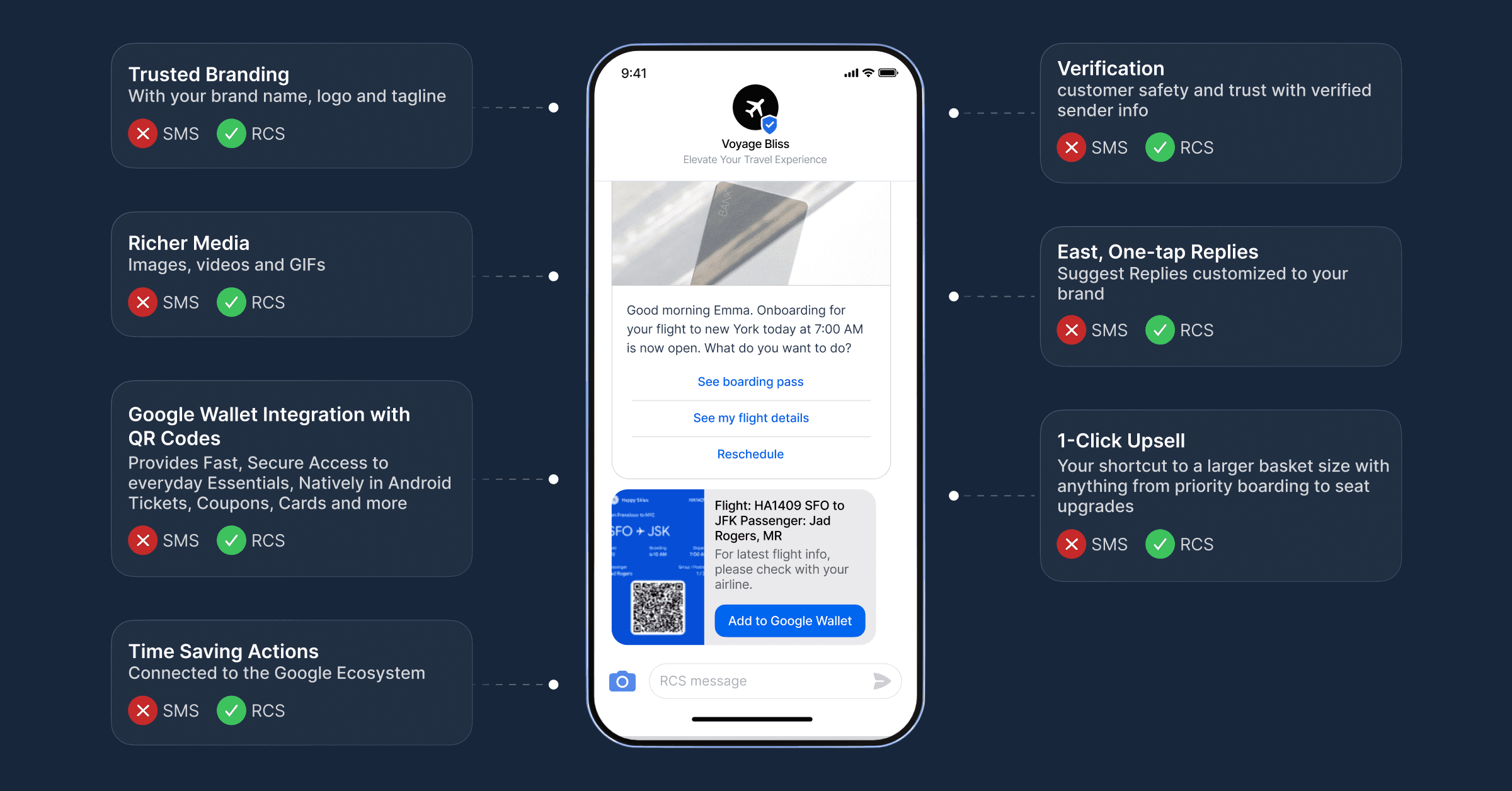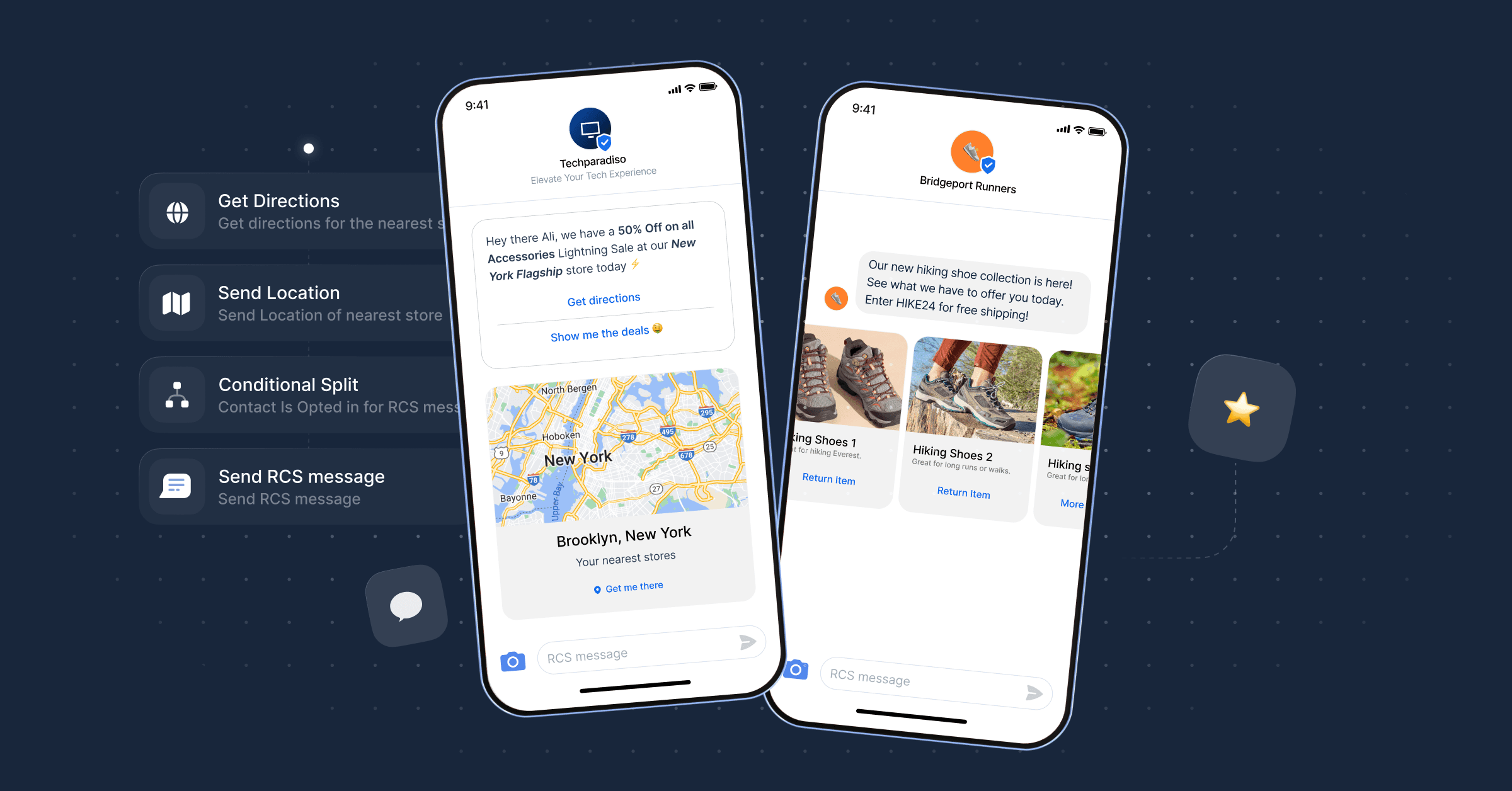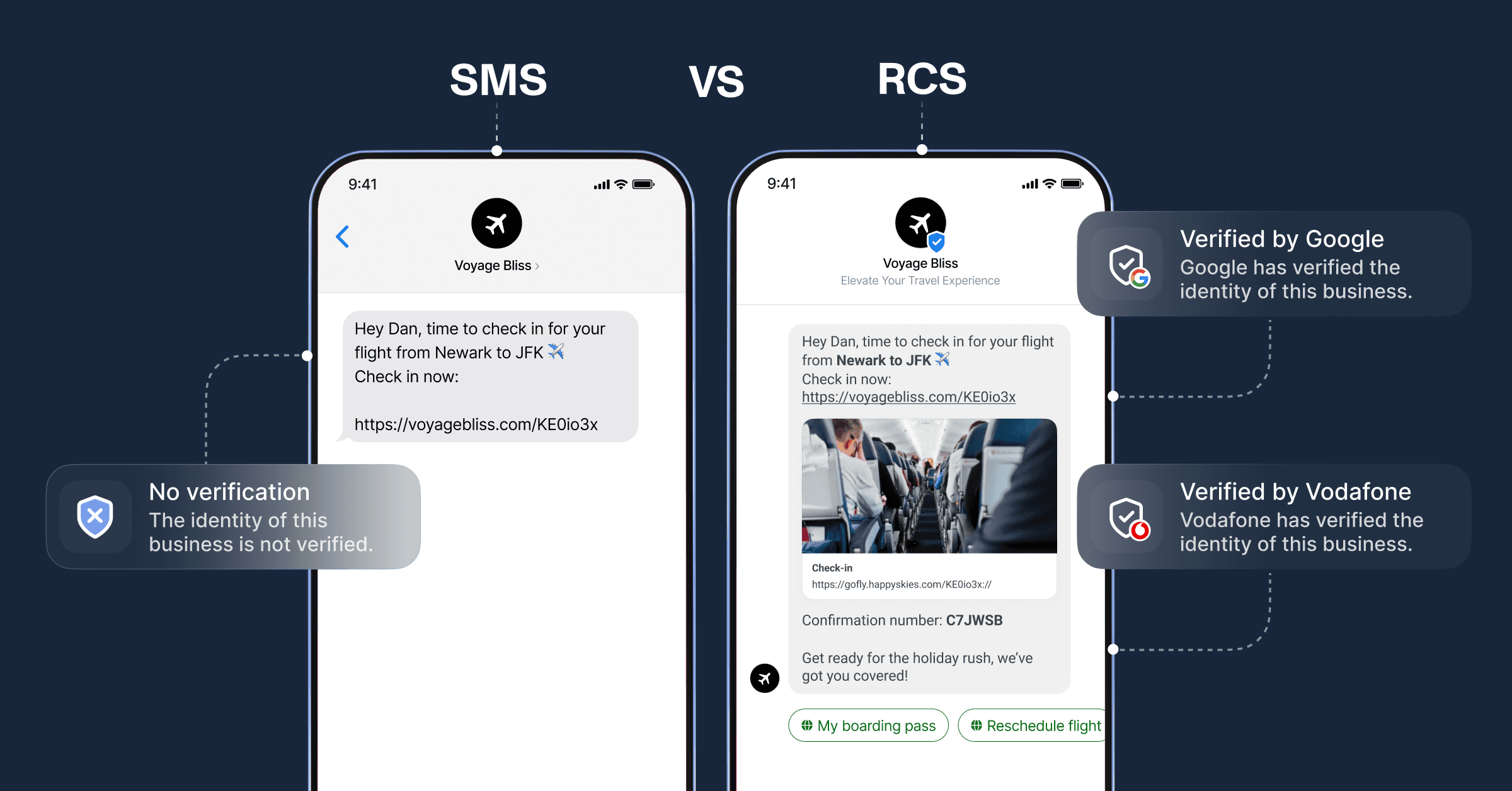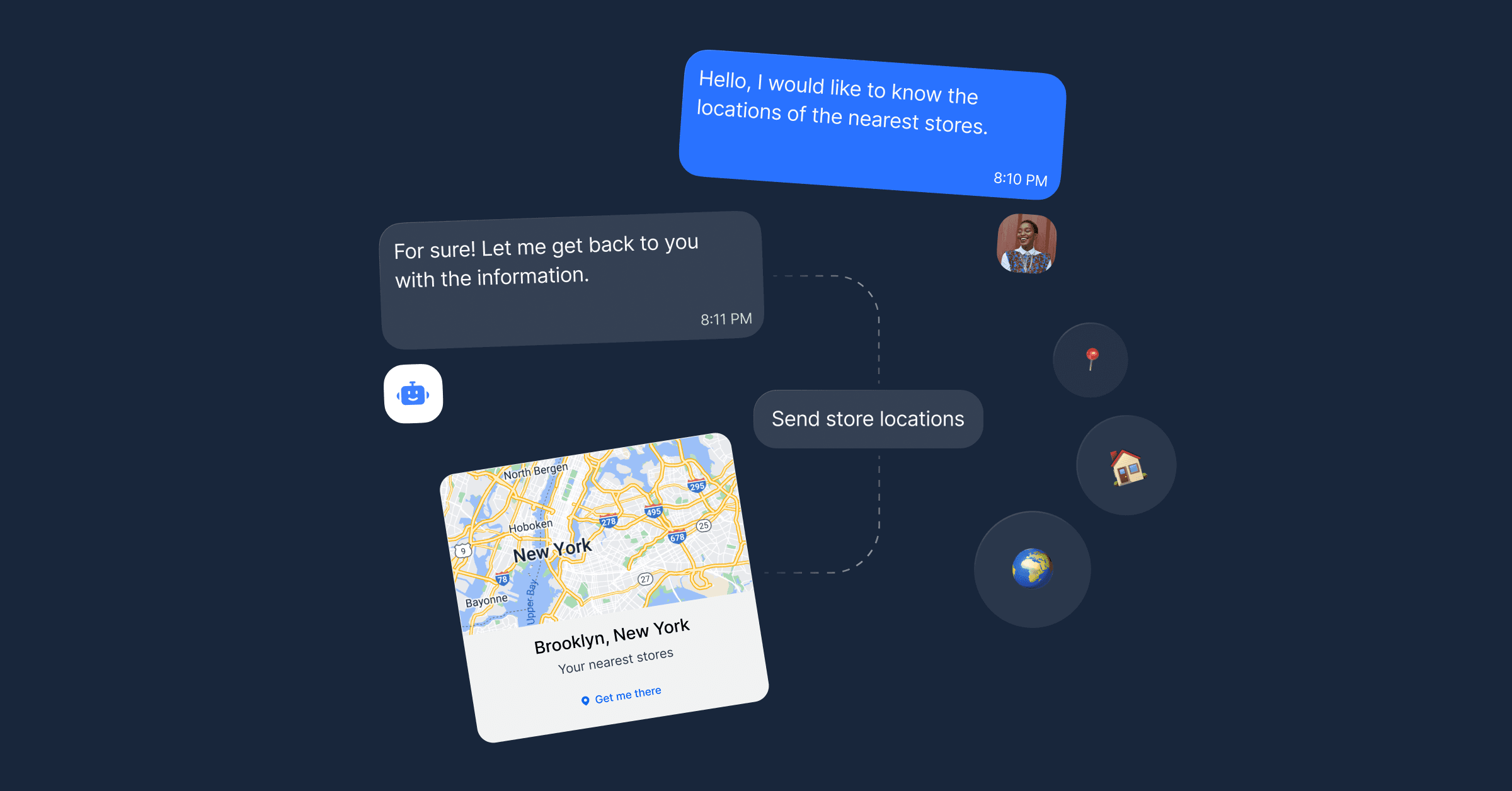

RCS Revolution: The end of SMS as we know it
Bird is delighted to introduce our support for RCS, offering businesses a powerful new way to connect with customers.
Published by
Bird
Date
Aug 7, 2024
Category
RCS
RCS
RCS
We are delighted to introduce our support for Rich Communication Services (RCS) messaging, offering businesses a powerful new way to connect with customers, increase reach, and significantly reduce costs over traditional SMS.
With RCS active users expected to hit 3.6 billion worldwide by 2026 (Source: Juniper Research), we recognize the immense potential of RCS to disrupt the SMS ecosystem. Unlike SMS, RCS allows the integration of multimedia, verified sender identities, and AI-driven customer support. Plus—with Bird, RCS delivers a significant cost reduction of up to 30% compared to SMS—and, the list goes on!
It's safe to say, there are multiple reasons to wave goodbye to the limitations of SMS and embrace the future of messaging with RCS.
In this article, we unpack what RCS is, how it compares to SMS and WhatsApp, and how you can use it to transform customer engagement for your business.

What is RCS Messaging?
RCS (Rich Communication Services) messaging is essentially a messaging protocol that enables the sending of feature-rich messages.
RCS enhances the traditional SMS experience by integrating features like suggested replies, multimedia, and interactive buttons. Businesses in turn use RCS marketing to send these rich, interactive messages directly to customers, creating more engaging communication experiences.
Initially, RCS suffered from fragmentation, as it was not supported consistently across all devices. However, recent collaborations between tech giants and mobile carriers have addressed these challenges, making RCS a more reliable and standardized medium for messaging.
RCS is now enabled on over 1 billion devices globally, with leading brands like Subway and Comex, leveraging its capabilities to 10x CTRs and double the uptake of promotional offers.

The key benefits of RCS for marketing
Increase conversions with personalized, interactive marketing
75% of people are more likely to purchase from a brand sharing rich media content. (Source: Verdict)
Unlike SMS’s text-only messages, RCS supports a myriad of engaging features. This includes videos, carousels, suggested replies, PDF sharing, Google Maps locations—to name a few. These features offer a much richer user experience for customers, ultimately leading to a significant boost in conversions for businesses.
RCS can be used to move prospects down the funnel:
Enhanced e-commerce experience
Seamless payments: Use GPay or the payment method of your choice via flexible payment integrations
Enhanced product discovery: Real-time inventory, detailed specs, and personalized recommendations
Conversational commerce: Interactive Q&A and instant purchase decisions
Seamless in-store experience
Location-based shopping: Find nearby stores and get directions
Convenient pick-up: In-store pickup options for online orders
Book and go: Schedule appointments directly from the chat

Build trust with verified identities
71% of users feel more confident about messages coming from a verified business. (Source: Google Research, 2020)
Unlike SMS, RCS messages are sent from verified businesses, reducing fraud and building customer trust. Business branding can only be used after Carrier or Google verification with RCS, compared to other channels where business profile pictures are not regulated.
This double verification process helps protect users from fraudulent activity and safeguards brands from identity theft. Also, this ultra secure process translates into direct uplifts across the customer journey.

Reduce SMS costs by up to 30%
Transitioning to RCS can reduce SMS costs by up to 30%, particularly for One-Time Passwords (OTPs) and transactional messages. Plus, with Bird, you won't pay any hidden fees or markups on RCS messages.
In comparison to others in the market, Bird doesn’t charge SMS processing fees. We will take the same approach to pricing for RCS—no hidden fees or markups—just straightforward RCS access for all our customers.
With Bird, you can achieve a richer communication experience and superior ROI, all at a lower cost than other RCS vendors. The potential return on investment is substantial for your business.
Deliver blazing-fast support powered by AI
With Bird you can seamlessly integrate RCS with any AI provider like OpenAI, Azure, or your own in-house LLM to create AI-powered chatbots and sales assistants. This provides instant support and quick resolutions to customer queries. This integration not only boosts customer satisfaction with instant responses but also reduces the workload on human agents, allowing them to focus on more complex tasks. By leveraging AI within RCS, you ensure efficient, real-time support and a superior customer experience.
24/7 Support: RCS seamlessly integrates with AI-powered chatbots to answer common queries, and resolve issues quickly
Increased agent efficiency: AI-powered chatbots help free up human agents to handle more complex needs, further enhancing customer satisfaction.
Personalized buyer experiences: AI-powered chatbots can be tuned to route users back to products, purchase flows, and related brand content with engaging RCS messages.

Streamline marketing campaigns by leveraging existing SMS Opt-in
Since RCS is built on the SMS protocol, an existing SMS opt-in can be leveraged for RCS messaging. This eliminates the need for additional user consent, helping to streamline marketing campaigns and allow for more efficient onboarding. In contrast, WhatsApp and Apple's messaging platforms require explicit permission for marketing messages.
RCS vs. SMS—What’s the difference?
While SMS remains the ubiquitous, reliable messaging standard, RCS is emerging as a compelling choice for businesses as the two major players in the mobile ecosystem — Apple and Google — throw their weight behind it. Google has been steadily expanding the reach of RCS through its native Google Messages app, which is now the default messaging app on many Android devices. On the Apple front, the upcoming rollout of iOS 18 will bring full RCS support to all iPhone handsets that upgrade to it.
This effort by Google and Apple to standardize and push RCS across their respective ecosystems makes RCS more accessible and reliable than ever before. RCS is quickly moving from a niche technology to a robust, widely supported standard, offering businesses a powerful new way to connect with customers.
Here’s how the two messaging standards stack up:

RCS vs. WhatsApp
WhatsApp is undoubtedly popular, but its scope is limited. It’s much more widely used in the EMEA markets than in the US, while RCS will roll out to users all across the globe.
RCS has the potential for much higher user adoption, as it can reach more devices compared to WhatsApp's smaller total addressable market. Also, RCS’ direct connectivity with mobile carriers promises a more seamless, reliable message delivery experience than WhatsApp.
The time to adopt RCS is now
Now with Apple’s support tossed behind it in its latest iOS 18 software update, RCS is poised to become the new standard for business messaging.
Its advanced features—rich media, two-way interactions, and enhanced analytics—offer unparalleled opportunities for businesses to engage customers like never before. As consumer expectations for interactive and personalized communication grow, RCS provides the tools to meet and exceed those demands.
Don’t fall behind with outdated SMS technology. The time is now to innovate and connect with your audience in a more dynamic and meaningful way.
Learn more about onboarding RCS and request a demo of Bird today.
We are delighted to introduce our support for Rich Communication Services (RCS) messaging, offering businesses a powerful new way to connect with customers, increase reach, and significantly reduce costs over traditional SMS.
With RCS active users expected to hit 3.6 billion worldwide by 2026 (Source: Juniper Research), we recognize the immense potential of RCS to disrupt the SMS ecosystem. Unlike SMS, RCS allows the integration of multimedia, verified sender identities, and AI-driven customer support. Plus—with Bird, RCS delivers a significant cost reduction of up to 30% compared to SMS—and, the list goes on!
It's safe to say, there are multiple reasons to wave goodbye to the limitations of SMS and embrace the future of messaging with RCS.
In this article, we unpack what RCS is, how it compares to SMS and WhatsApp, and how you can use it to transform customer engagement for your business.

What is RCS Messaging?
RCS (Rich Communication Services) messaging is essentially a messaging protocol that enables the sending of feature-rich messages.
RCS enhances the traditional SMS experience by integrating features like suggested replies, multimedia, and interactive buttons. Businesses in turn use RCS marketing to send these rich, interactive messages directly to customers, creating more engaging communication experiences.
Initially, RCS suffered from fragmentation, as it was not supported consistently across all devices. However, recent collaborations between tech giants and mobile carriers have addressed these challenges, making RCS a more reliable and standardized medium for messaging.
RCS is now enabled on over 1 billion devices globally, with leading brands like Subway and Comex, leveraging its capabilities to 10x CTRs and double the uptake of promotional offers.

The key benefits of RCS for marketing
Increase conversions with personalized, interactive marketing
75% of people are more likely to purchase from a brand sharing rich media content. (Source: Verdict)
Unlike SMS’s text-only messages, RCS supports a myriad of engaging features. This includes videos, carousels, suggested replies, PDF sharing, Google Maps locations—to name a few. These features offer a much richer user experience for customers, ultimately leading to a significant boost in conversions for businesses.
RCS can be used to move prospects down the funnel:
Enhanced e-commerce experience
Seamless payments: Use GPay or the payment method of your choice via flexible payment integrations
Enhanced product discovery: Real-time inventory, detailed specs, and personalized recommendations
Conversational commerce: Interactive Q&A and instant purchase decisions
Seamless in-store experience
Location-based shopping: Find nearby stores and get directions
Convenient pick-up: In-store pickup options for online orders
Book and go: Schedule appointments directly from the chat

Build trust with verified identities
71% of users feel more confident about messages coming from a verified business. (Source: Google Research, 2020)
Unlike SMS, RCS messages are sent from verified businesses, reducing fraud and building customer trust. Business branding can only be used after Carrier or Google verification with RCS, compared to other channels where business profile pictures are not regulated.
This double verification process helps protect users from fraudulent activity and safeguards brands from identity theft. Also, this ultra secure process translates into direct uplifts across the customer journey.

Reduce SMS costs by up to 30%
Transitioning to RCS can reduce SMS costs by up to 30%, particularly for One-Time Passwords (OTPs) and transactional messages. Plus, with Bird, you won't pay any hidden fees or markups on RCS messages.
In comparison to others in the market, Bird doesn’t charge SMS processing fees. We will take the same approach to pricing for RCS—no hidden fees or markups—just straightforward RCS access for all our customers.
With Bird, you can achieve a richer communication experience and superior ROI, all at a lower cost than other RCS vendors. The potential return on investment is substantial for your business.
Deliver blazing-fast support powered by AI
With Bird you can seamlessly integrate RCS with any AI provider like OpenAI, Azure, or your own in-house LLM to create AI-powered chatbots and sales assistants. This provides instant support and quick resolutions to customer queries. This integration not only boosts customer satisfaction with instant responses but also reduces the workload on human agents, allowing them to focus on more complex tasks. By leveraging AI within RCS, you ensure efficient, real-time support and a superior customer experience.
24/7 Support: RCS seamlessly integrates with AI-powered chatbots to answer common queries, and resolve issues quickly
Increased agent efficiency: AI-powered chatbots help free up human agents to handle more complex needs, further enhancing customer satisfaction.
Personalized buyer experiences: AI-powered chatbots can be tuned to route users back to products, purchase flows, and related brand content with engaging RCS messages.

Streamline marketing campaigns by leveraging existing SMS Opt-in
Since RCS is built on the SMS protocol, an existing SMS opt-in can be leveraged for RCS messaging. This eliminates the need for additional user consent, helping to streamline marketing campaigns and allow for more efficient onboarding. In contrast, WhatsApp and Apple's messaging platforms require explicit permission for marketing messages.
RCS vs. SMS—What’s the difference?
While SMS remains the ubiquitous, reliable messaging standard, RCS is emerging as a compelling choice for businesses as the two major players in the mobile ecosystem — Apple and Google — throw their weight behind it. Google has been steadily expanding the reach of RCS through its native Google Messages app, which is now the default messaging app on many Android devices. On the Apple front, the upcoming rollout of iOS 18 will bring full RCS support to all iPhone handsets that upgrade to it.
This effort by Google and Apple to standardize and push RCS across their respective ecosystems makes RCS more accessible and reliable than ever before. RCS is quickly moving from a niche technology to a robust, widely supported standard, offering businesses a powerful new way to connect with customers.
Here’s how the two messaging standards stack up:

RCS vs. WhatsApp
WhatsApp is undoubtedly popular, but its scope is limited. It’s much more widely used in the EMEA markets than in the US, while RCS will roll out to users all across the globe.
RCS has the potential for much higher user adoption, as it can reach more devices compared to WhatsApp's smaller total addressable market. Also, RCS’ direct connectivity with mobile carriers promises a more seamless, reliable message delivery experience than WhatsApp.
The time to adopt RCS is now
Now with Apple’s support tossed behind it in its latest iOS 18 software update, RCS is poised to become the new standard for business messaging.
Its advanced features—rich media, two-way interactions, and enhanced analytics—offer unparalleled opportunities for businesses to engage customers like never before. As consumer expectations for interactive and personalized communication grow, RCS provides the tools to meet and exceed those demands.
Don’t fall behind with outdated SMS technology. The time is now to innovate and connect with your audience in a more dynamic and meaningful way.
Learn more about onboarding RCS and request a demo of Bird today.
We are delighted to introduce our support for Rich Communication Services (RCS) messaging, offering businesses a powerful new way to connect with customers, increase reach, and significantly reduce costs over traditional SMS.
With RCS active users expected to hit 3.6 billion worldwide by 2026 (Source: Juniper Research), we recognize the immense potential of RCS to disrupt the SMS ecosystem. Unlike SMS, RCS allows the integration of multimedia, verified sender identities, and AI-driven customer support. Plus—with Bird, RCS delivers a significant cost reduction of up to 30% compared to SMS—and, the list goes on!
It's safe to say, there are multiple reasons to wave goodbye to the limitations of SMS and embrace the future of messaging with RCS.
In this article, we unpack what RCS is, how it compares to SMS and WhatsApp, and how you can use it to transform customer engagement for your business.

What is RCS Messaging?
RCS (Rich Communication Services) messaging is essentially a messaging protocol that enables the sending of feature-rich messages.
RCS enhances the traditional SMS experience by integrating features like suggested replies, multimedia, and interactive buttons. Businesses in turn use RCS marketing to send these rich, interactive messages directly to customers, creating more engaging communication experiences.
Initially, RCS suffered from fragmentation, as it was not supported consistently across all devices. However, recent collaborations between tech giants and mobile carriers have addressed these challenges, making RCS a more reliable and standardized medium for messaging.
RCS is now enabled on over 1 billion devices globally, with leading brands like Subway and Comex, leveraging its capabilities to 10x CTRs and double the uptake of promotional offers.

The key benefits of RCS for marketing
Increase conversions with personalized, interactive marketing
75% of people are more likely to purchase from a brand sharing rich media content. (Source: Verdict)
Unlike SMS’s text-only messages, RCS supports a myriad of engaging features. This includes videos, carousels, suggested replies, PDF sharing, Google Maps locations—to name a few. These features offer a much richer user experience for customers, ultimately leading to a significant boost in conversions for businesses.
RCS can be used to move prospects down the funnel:
Enhanced e-commerce experience
Seamless payments: Use GPay or the payment method of your choice via flexible payment integrations
Enhanced product discovery: Real-time inventory, detailed specs, and personalized recommendations
Conversational commerce: Interactive Q&A and instant purchase decisions
Seamless in-store experience
Location-based shopping: Find nearby stores and get directions
Convenient pick-up: In-store pickup options for online orders
Book and go: Schedule appointments directly from the chat

Build trust with verified identities
71% of users feel more confident about messages coming from a verified business. (Source: Google Research, 2020)
Unlike SMS, RCS messages are sent from verified businesses, reducing fraud and building customer trust. Business branding can only be used after Carrier or Google verification with RCS, compared to other channels where business profile pictures are not regulated.
This double verification process helps protect users from fraudulent activity and safeguards brands from identity theft. Also, this ultra secure process translates into direct uplifts across the customer journey.

Reduce SMS costs by up to 30%
Transitioning to RCS can reduce SMS costs by up to 30%, particularly for One-Time Passwords (OTPs) and transactional messages. Plus, with Bird, you won't pay any hidden fees or markups on RCS messages.
In comparison to others in the market, Bird doesn’t charge SMS processing fees. We will take the same approach to pricing for RCS—no hidden fees or markups—just straightforward RCS access for all our customers.
With Bird, you can achieve a richer communication experience and superior ROI, all at a lower cost than other RCS vendors. The potential return on investment is substantial for your business.
Deliver blazing-fast support powered by AI
With Bird you can seamlessly integrate RCS with any AI provider like OpenAI, Azure, or your own in-house LLM to create AI-powered chatbots and sales assistants. This provides instant support and quick resolutions to customer queries. This integration not only boosts customer satisfaction with instant responses but also reduces the workload on human agents, allowing them to focus on more complex tasks. By leveraging AI within RCS, you ensure efficient, real-time support and a superior customer experience.
24/7 Support: RCS seamlessly integrates with AI-powered chatbots to answer common queries, and resolve issues quickly
Increased agent efficiency: AI-powered chatbots help free up human agents to handle more complex needs, further enhancing customer satisfaction.
Personalized buyer experiences: AI-powered chatbots can be tuned to route users back to products, purchase flows, and related brand content with engaging RCS messages.

Streamline marketing campaigns by leveraging existing SMS Opt-in
Since RCS is built on the SMS protocol, an existing SMS opt-in can be leveraged for RCS messaging. This eliminates the need for additional user consent, helping to streamline marketing campaigns and allow for more efficient onboarding. In contrast, WhatsApp and Apple's messaging platforms require explicit permission for marketing messages.
RCS vs. SMS—What’s the difference?
While SMS remains the ubiquitous, reliable messaging standard, RCS is emerging as a compelling choice for businesses as the two major players in the mobile ecosystem — Apple and Google — throw their weight behind it. Google has been steadily expanding the reach of RCS through its native Google Messages app, which is now the default messaging app on many Android devices. On the Apple front, the upcoming rollout of iOS 18 will bring full RCS support to all iPhone handsets that upgrade to it.
This effort by Google and Apple to standardize and push RCS across their respective ecosystems makes RCS more accessible and reliable than ever before. RCS is quickly moving from a niche technology to a robust, widely supported standard, offering businesses a powerful new way to connect with customers.
Here’s how the two messaging standards stack up:

RCS vs. WhatsApp
WhatsApp is undoubtedly popular, but its scope is limited. It’s much more widely used in the EMEA markets than in the US, while RCS will roll out to users all across the globe.
RCS has the potential for much higher user adoption, as it can reach more devices compared to WhatsApp's smaller total addressable market. Also, RCS’ direct connectivity with mobile carriers promises a more seamless, reliable message delivery experience than WhatsApp.
The time to adopt RCS is now
Now with Apple’s support tossed behind it in its latest iOS 18 software update, RCS is poised to become the new standard for business messaging.
Its advanced features—rich media, two-way interactions, and enhanced analytics—offer unparalleled opportunities for businesses to engage customers like never before. As consumer expectations for interactive and personalized communication grow, RCS provides the tools to meet and exceed those demands.
Don’t fall behind with outdated SMS technology. The time is now to innovate and connect with your audience in a more dynamic and meaningful way.
Learn more about onboarding RCS and request a demo of Bird today.
The AI-first CRM for Marketing, Service and Payments
By clicking "Get a Demo" you agree to Bird's
The AI-first CRM for Marketing, Service and Payments
By clicking "Get a Demo" you agree to Bird's
The AI-first CRM for Marketing, Service and Payments
By clicking "Get a Demo" you agree to Bird's
© 2024 Bird. All rights reserved.
Made with <3 in Amsterdam
Privacy settings
© 2024 Bird. All rights reserved.
Made with <3 in Amsterdam
Privacy settings
© 2024 Bird. All rights reserved.
Made with <3 in Amsterdam
Privacy settings